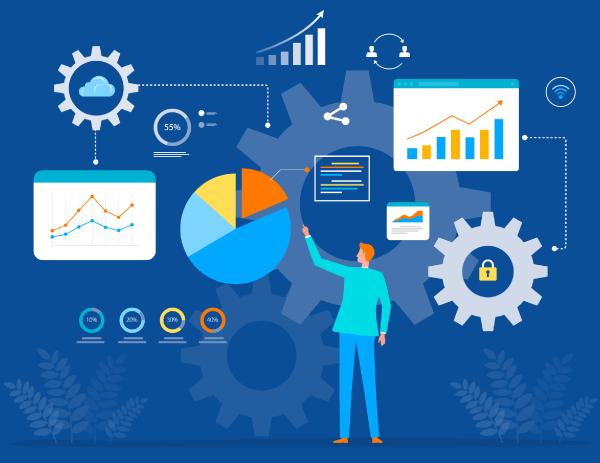In today’s fast-paced and highly digitised marketplace, data analytics has evolved from a specialised field into a fundamental component of business success. Whether a company is a large multinational corporation or a small startup, the ability to collect, interpret, and act on data is crucial for making informed decisions, improving operational efficiency, and enhancing customer satisfaction.
This post examines the importance, benefits, and challenges of data analytics, providing business leaders with a framework to better understand and utilise its potential in their strategic planning.
What is Data Analytics?
At its core, data analytics involves the systematic computational analysis of data or statistics to uncover meaningful patterns, trends, and relationships. This process encompasses several types of analysis, including:
-
Descriptive Analytics – What happened?
-
Diagnostic Analytics – Why did it happen?
-
Predictive Analytics – What might happen next?
-
Prescriptive Analytics – What Should Be Done?
By employing these analytical approaches, businesses can transform raw data into actionable insights, guiding both short-term actions and long-term strategy.
The Importance of Data Analytics in Business
The role of data analytics in modern organisations is both transformative and foundational. Key reasons for its growing importance include:
-
Data as a Strategic Asset: Informed decisions are now largely dependent on the ability to interpret data accurately.
-
Customer-Centric Strategy: Businesses must understand customer behaviour in real time to remain competitive.
-
Performance Measurement: Metrics from marketing, operations, HR, and finance enable better tracking and optimisation.
-
Agility and Innovation: Analytics enable quicker responses to market changes and foster continuous improvement.
In essence, companies that effectively use data analytics are better positioned to anticipate market demands, personalise customer engagement, and outperform competitors.
The Power of Data Analytics: 5 Benefits You Can’t Ignore
Below are five critical benefits that highlight the transformative potential of data analytics:
1. Better Decision-Making
Data-driven insights reduce guesswork. With access to real-time dashboards and historical trend analysis, decision-makers are better equipped to choose strategies grounded in evidence rather than intuition. For example, predictive models can help forecast customer churn or identify high-potential markets for expansion.
2. Increased Operational Efficiency
Data analytics streamlines processes by identifying bottlenecks, redundancies, or underused resources. By automating data collection and analysis, businesses save time and reduce manual labour. Analytics can also guide improvements in supply chain management, resource allocation, and inventory optimisation.
3. Improved Customer Experience
Understanding customer preferences, behaviours, and feedback allows businesses to create more personalised and responsive experiences. Data analytics enables segmentation, personalized recommendations, and targeted marketing campaigns—enhancing satisfaction and long-term loyalty.
4. Competitive Advantage
Access to insights about market trends, pricing, competitor activity, and consumer demand gives businesses the edge they need to differentiate their offerings. With this knowledge, companies can innovate more quickly and make strategic moves that outpace their competitors.
5. Cost Savings
Through process optimisation and data-driven budgeting, analytics uncovers cost-cutting opportunities without compromising quality. For instance, workforce analytics might reveal overstaffed shifts, while procurement data may identify inefficient vendor contracts.
Potential Disadvantages and Challenges of Data Analytics
While the benefits are substantial, it’s important to acknowledge the challenges and risks associated with data analytics:
1. Data Quality Issues
Inaccurate, incomplete, or inconsistent data can lead to flawed conclusions. Data integrity must be maintained through validation and cleansing procedures.
2. Privacy and Compliance Risks
Handling customer and employee data must align with regulations such as GDPR or HIPAA. Mismanagement can lead to legal consequences and reputational damage.
3. High Implementation Costs
Advanced analytics tools and platforms often require significant upfront investment in infrastructure, software, and skilled personnel.
4. Talent Shortage
There is a growing demand for data scientists, analysts, and engineers, but finding qualified professionals can be challenging for smaller organisations.
5. Overreliance on Data
Excessive dependence on data may stifle creativity or delay decision-making if leaders wait for “perfect” information. A balance between data insights and managerial judgment is essential.
5 Must-Read Books for Data Analytics
Data analytics is a rapidly growing field, and staying updated with the latest trends and techniques is crucial for professionals in this industry. In this article, we have compiled a list of five must-read books for data analytics professionals that cover a wide range of topics, from data visualisation to machine learning algorithms.
- “Data Science for Business” by Foster Provost and Tom Fawcett: If you want to learn more about how data analytics may help your company make better choices, this book is a great place to start.
- “Python for Data Analysis” by Wes McKinney: When it comes to analysing data, Python is one of the most widely utilised languages. Topics such as data cleaning, data reshaping, and statistical analysis are thoroughly covered.
- “Storytelling with Data” by Cole Nussbaumer Knaflic: To effectively transmit insights to stakeholders, data visualisation is crucial. This book walks readers through the steps of developing visually appealing and informative data visualisations, all while teaching them the fundamentals of visual communication.
- “Data Mining: Practical Machine Learning Tools and Techniques” by Ian H. Witten, Eibe Frank, and Mark A. Hall: Classification, regression, clustering, and association rule mining are only a few of the data mining methods covered in this book.
- “Big Data: A Revolution That Will Transform How We Live, Work, and Think” by Viktor Mayer-Schönberger and Kenneth Cuvier: This book delves into the implications of big data on numerous facets of modern life, as the subtitle suggests.
Overall, these books offer valuable insights and practical guidance on different aspects of data science, data analysis, and the impact of big data, making them essential reads for professionals and enthusiasts in the field.
Conclusion
In conclusion, the power of data analytics cannot be underestimated in today’s fast-paced and data-driven world. By harnessing the insights and trends hidden within large datasets, businesses can make informed decisions, optimise their operations, enhance customer experiences, and drive innovation. Embracing data analytics is not just a trend, but a strategic imperative for any organisation looking to succeed in the modern business landscape.

